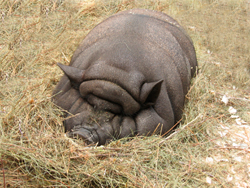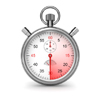By Al Sears, MD

Don't want to look like a pig? Don't eat like a pig!
Guess what they feed a pig if they want to make it as fat as possible as fast as possible?
Low-fat milk.
Because if they give the pig milk with fat in it, the pig gets satiated. It’s satisfied and won’t eat any more. But if they give it low-fat milk, it will eat the grain they feed it forever because it’ll have a deficiency of fat.
Now think of what we’re eating for breakfast in this country…
If you don’t want to get fat you’re told to drink low-fat milk, and corn or wheat or oat-based cereal.
It’s the prescription to make you as fat as possible as quickly as you can get there. You’ll never stop wanting to eat because you’re never getting any food that causes satiation.
Americans are told to eat a diet that is scientifically designed to make you as fat as possible as fast as possible.
But, without eating fat, you’d have no way of getting nutrients to your organs. Without fat, your brain would be the size of a frog’s. Without fat, you wouldn’t be alive.
I don’t know why modern nutritionists and dieticians keep telling you not to eat fat.
If someone were building a body, fat would be like the designer’s dream.
Imagine building blocks for your body that can make themselves into walls. That can change the wall’s location and thickness from minute to minute depending on your needs. That in some places are impregnable, and in other places let nutrients in and waste out. That open and close to let in light and air.
Living cells are made up of these building blocks. They’re called lipids. Lipid molecules have a head and a tail. And the tails are made entirely of fat.
These fatty lipids make up the membrane of all your cells. What belongs inside — and doesn’t belong — changes constantly, and your lipids change and play traffic cop.
For example, the “sheath” that surrounds all your nerves is made of myelin. It insulates the nerve axon so it can efficiently send electrical impulses. These myelin cells’ fatty acids bond to each other, creating a tough coat.
Without enough fat, you could suffer demyelination, where your nerves lose their insulation and can’t transmit their signals efficiently.
Fat is also what helps you transport nutrients around your body and deliver them where they’re needed. Vitamins A, D, E, K and CoQ10 can’t even be absorbed without fat.
In fact, fat is so important that do you know what your body does if it senses you’re starving? It does everything it can to preserve your fat stores.
And if you’re carrying a few excess pounds, that’s exactly what’s happening to you. Your body is storing fat because it’s getting the signal you are starving. It happens when you eat too many carbohydrates.
To change this, eat more fat and protein, and fewer carbohydrates.
Protein creates an environment of abundance and good times in your body. And eating fat helps you know you’re full and well-fed.
The other side of that coin is that you don’t need body fat if you will eat well again tomorrow. So, you will start to melt existing fat. A lack of protein does the opposite. It tells your body to store fat because your body fears famine.
Protein and fat are your keys to good health. Without them you’ll die. Carbs are a different story.
Here’s something that might surprise you: Your daily requirement of carbs is zero. You don’t need carbs at all. You can easily make carbs from fat or protein.
Industry took away many of the good fats we need — and said they were bad. As a substitute, they gave us man-made fats, which turned out to be dangerous.
The key to body fat reduction is NOT to deprive yourself of the fatty foods you were born to eat.
The best part is that foods rich in fat and protein are the best tasting. You just need to make sure you eat the right kinds of fats in the right ratios.
- Meat and eggs are your best sources. If possible, eat grass-fed beef. The flavor is great and it’s far better for you because it has the right kinds of fats. An ounce of meat has about 7 grams of protein.
- Eggs are the perfect food. I eat them every day. They are the “Gold Standard” by which we rate all other protein. This means that all of the amino acids are there in the ratios you need in one place. For best results, eat eggs that come from free-range chickens.
- Stay away from man-made fats, or trans fats. Trans-fat is the result of “hydrogenation.” When a hydrogen molecule is added to vegetable oils, it turns them to fatty solids. These fatty solids replace animal fats. Your body doesn’t recognize them as food, and when you eat this kind of fat you never feel full.
Other good sources of protein are wild-caught salmon and other cold-water fish. Plus the following nuts and seeds have plenty of good fats and the most protein:
1. Almonds, ¼ cup — 8 grams
2. Peanuts, ¼ cup — 9 grams
3. Cashews, ¼ cup — 5 grams
4. Sunflower seeds, ¼ cup — 6 grams
5. Pumpkin seeds, ¼ cup — 8 grams
Two more foods with healthy fats include kiwi fruit and avocados. Kiwi, also called Chinese gooseberries, have a ton of fiber, vitamin K and omega-3 fats. Avocados have an amino acid score nearly as high as eggs. They are packed with vitamins, choline and magnesium. They have very few carbs, and are loaded with heart-healthy fats.
Most Popular:

She Dropped 45 Pounds by Walking 45 Seconds

